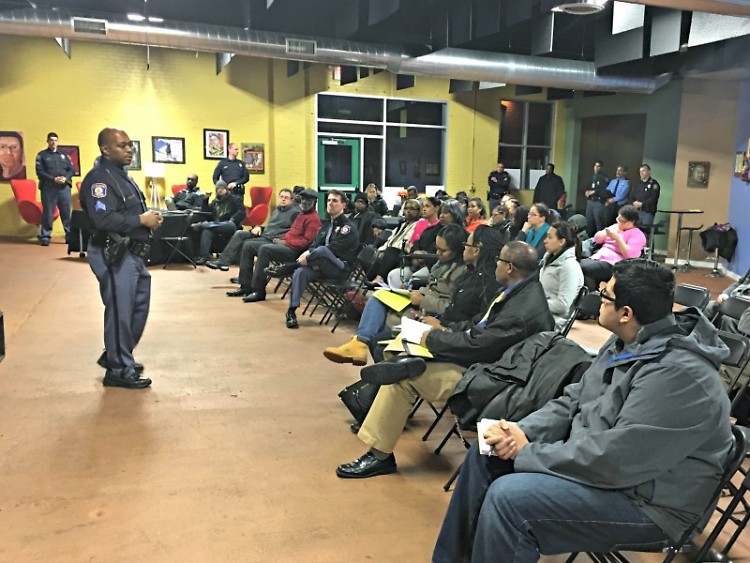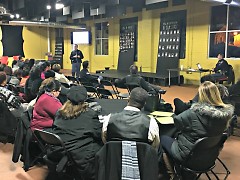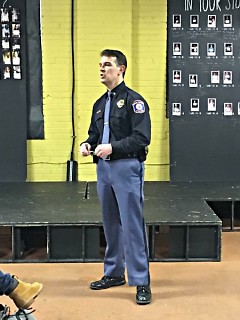On December 15, 2015, the City Commissioners of Grand Rapids voted 5-2 in favor of allowing the purchase of 65 assault rifles for the Grand Rapids Police Department (GRPD). If you weren’t aware of this, then stop and take a moment to process how that makes you feel. I’m not only talking about the purchasing of the weapons, as some of you reading this are in favor of guns and some are not. What I mean is how does it make you feel that you did not know? How does it make you feel that there was no public discussion? How do you feel about this decision being made by your community leaders in a meeting that didn’t allow for public comment?
The police didn’t bring forth one document, one statistic, one study- not even an outline of a training plan or usage protocol- to the public. That feeling you may be experiencing, with questions running through your head and a lost sense of ownership in your democracy, is at the heart of how and why the Community Police Relations Council (CPRC) was formed.
The inspiration for the CPRC came a few weeks after the purchase authorization was approved when an event was held by Equity Drinks at The Rezervoir Lounge here in Grand Rapids. The Chief of the GRPD, David Rahinsky, was invited by the organizers to speak and listen to the concerns of the public regarding the recent vote on assault rifles.
After a brief introduction and explanation by the Chief, the floor was opened up for public comment, and boy did the public comment. From rationale and reasoning for this purchase, how they will be used or more importantly not be used, training practices, to transparency, accountability, conflict management and de-escalation techniques and on and on and on, the community spoke.
As concerns were voiced, there was a complete lack of meaningful responses. Only talking points and replies regarding statistics such as “I don’t know,” “we are developing that,” or “we don’t have that information” were given. So, a few days later, a group of volunteers consisting of Aquoinette Blair, Rodney Robinson, Tanell Thomas, Tempest Warfield and myself, Russell Olmsted, met at the request of Jeremy Moore and Ken Miguel-Cipriano, organizers for Equity Drinks, to discuss and evaluate how the police and community interact and shape enforcement policy.
As we looked over a record of feedback and comments from participants in the discussion with the Chief, we came to an understanding that there was a commonality between the issues and concerns raised by the community. It wasn’t as simple as a disagreement over the GRPD purchasing assault rifles. There was an apparent and deep disconnect between the conversation the public was engaging in and the conversation that the GRPD was prepared to have.
This goes well beyond one central issue or disagreement. It’s a fundamental breakdown or lack of understanding on how and why we have civil discourse in the first place. It’s not just to talk about an issue. Civil discourse is about identifying the cause of an issue, coming to a resolution on how to solve it and putting a system of accountability in place to ensure that the resolution is followed. It doesn't matter whether it's assault rifles, body cameras, diversity of the police force, implementation of the 12 Point Plan or a ticket for jaywalking.
Until both sides are engaging in the same conversation and agree to hold to the principles established in that conversation, nothing can be gained. We’ll just continue to talk past each other and never answer the real question at the heart of the problem: how do you want to be policed?
There are meetings being held by the GRPD in the four sections of Grand Rapids. These meetings are, in part, an attempt to acquire public input on the writing of a new Mission Statement for the Grand Rapids Police Department. Their current statement reads
“The members of the Grand Rapids Police Department are committed to providing the highest quality of professional police services. We strive to protect life, enforce and uphold the law, preserve order, and protect property. In partnership with citizens, city government, and other stakeholders, we commit ourselves to improving the quality of life in our community.”
It seems well rounded and descriptive in spite of being a bit dated. There are things in it that should be changed, like a consideration on the word stakeholders.
But what is the point of writing a new mission statement if you don’t uphold to the ideals of the current one? How are new words, that are hopefully memorized this time, going to help in solving the hard truths that the GRPD continues to deny exist? First they need to truly start to participate “in partnership with citizens” by addressing the stark lack of diversity in our force, the need to re-allocate resources and understand that diversity training and conflict management aren’t simply things you can check off a list. Until then, the words won’t matter because the problems will be the same.
How do we do this? How do we work to bridge this divide? The CPRC recognizes this responsibility does not solely fall on the police or our representatives. We know that both the first and last lines of oversight in a democracy fall on the community. We recognize that without informed and active engagement by that community, these types of breakdowns in discourse will only continue.
In the interest of breaking this cycle, we are combining the questions and concerns voiced at both the Equity Drinks event and the GRPD public meetings, and are submitting a set of recommendations to the City Commission and the Chief of Police for consideration.
We will also be reaching out to the diverse population of our city to work directly with the community, organizations and civic leaders to form a Network for Accountability. This network through increased civic action and awareness, petitions, circulation of information and ideas, will help hold the GRPD and City Commission accountable, not only to enacting the reforms they’ve already undertaken, but to work on the recommendations we submit.
Never again should a vote be held on how you and your community are policed and you aren’t allowed a voice. Never again should new equipment and tactics be approved for our police force with no study or plan shared with the public about why they’re needed or how they will be implemented.
This will not be possible without community support, energy and involvement. Without it, the divide will grow and apathy will rule. We ask that you join us in our goal to make this collaborative engagement for accountability a reality. We will work with the GRPD and City Commission to reform interaction with the community and to improve efficacy of public discourse in the hopes of forming a long lasting, shared commonality that influences and informs the protocols and policies of how the community wants to be policed.
As a reminder, the next two public meetings are asking for community input on rewriting their mission statement. These meetings offer the opportunity to start the engagement and real conversation. Two meetings have already taken place on the West and South sides of Grand Rapids and CPRC was present at both.
This week offers two more opportunities for you to get involved – Wednesday January 27, 7:00 p.m. at GRPS University (1400 Fuller Ave. NE), and Thursday January 28, 7:00 p.m. at Seymour Christian Church (480 Alger Street SE). We hope that you will be there to ensure that your voice and vision for your community is recognized.
For more information regarding the CPRC and/or to volunteer your time, please visit and follow our Facebook page.
For questions, comments, or to contact us, email us.
This article was written with the editing assistance of Aquoinette Blair.
The Rapidian, a program of the 501(c)3 nonprofit Community Media Center, relies on the community’s support to help cover the cost of training reporters and publishing content.
We need your help.
If each of our readers and content creators who values this community platform help support its creation and maintenance, The Rapidian can continue to educate and facilitate a conversation around issues for years to come.
Please support The Rapidian and make a contribution today.



